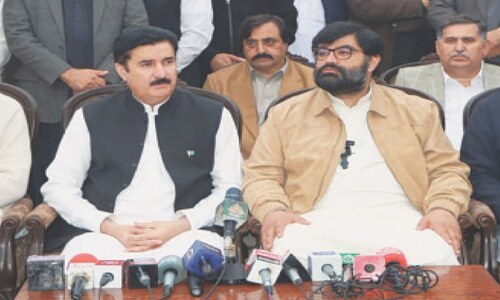PESHAWAR: A full bench of the Peshawar High Court (PHC) on Tuesday put on notice the deputy attorney general, Khyber Pakhtunkhwa advocate general and additional chief secretary Fata for assisting the court in deciding whether the court could exercise jurisdiction in the Federally Administered Tribal Areas (Fata) in different issues, including illegal detentions and services matters.
The bench comprising Chief Justice Mian Fasihul Mulk, Justice Mazhar Alam Miankhel, Justice Yahya Afridi, Justice Qaiser Rasheed and Justice Manzoor Hussain adjourned hearing of 60 writ petitions about issues pertaining to Fata and fixed March 17 for next hearing with the direction that the three officials should assist the court on this important constitutional matter.
The court also requested seven senior advocates, including Barrister Zahoorul Haq, Qazi Mohammad Anwer, Abdul Lateef Afridi, Abdul Samad Khan, Imtiaz Ali, Wali Khan Afridi and Tariq Afridi, to appear as amicus curiae for assisting the court.
The bench has formulated seven questions to be addressed by the government lawyers, amicus curiae and counsels for the petitioners. It ruled that it had to determine in which matters related to Fata the court had the jurisdiction under Article 247 (7) of the Constitution.
Article 247 (7) of the Constitution bars the Supreme Court and high courts from exercising any jurisdiction under the Constitution in relation to tribal areas.
The questions formulated by the court are: Whether the court has jurisdiction regarding federal and provincial employees working in Fata on deputation? Whether the court has jurisdiction in cases of federal employees working against key posts in Fata? Whether the court has jurisdiction to entertain cases of employees recruited in Fata? Whether the court has jurisdiction to entertain cases of illegal detentions by officers in Fata? Whether the court has jurisdiction to look into decisions made by the Fata Tribunal in civil and criminal cases? Whether the court can exercise powers if cause of action arises/occurs in settled area, but proceedings are carried out by political authority in tribal areas? And whether the court can exercise jurisdiction in contractual obligations arising between the government functionaries of Fata and private persons?
The bench directed the amicus curiae to submit written comments regarding these questions before the next date. The court also stated that if they realised that there was need for formulating any other question they should also submit the same to the court.
Most of the writ petitions pertain to service matters of different government employees doing job in Fata. Some of the cases are related to detentions under the Frontier Crimes Regulation in different tribal agencies.
One of the petitions pertains to the challenging of Article 101 (2) of the Constitution, which is related to appointment of governor of a province.
The petition was filed by two advocates from tribal areas, including Ijaz Mohmand and Taj Mahal Afridi, praying the court to declare the Article 101 (2) as unconstitutional.
They stated that the said article was discriminatory towards the tribal people as in its present form no tribal person could be appointed governor of Khyber Pakhtunkhwa.















































Dear visitor, the comments section is undergoing an overhaul and will return soon.